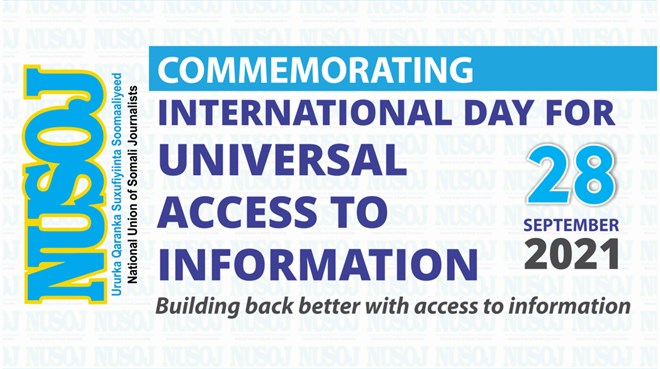
Tuesday September 28, 2021

The National Union of Somali Journalists (NUSOJ) joins the rest of the world in marking the International Day for Universal Access to Information under the theme “Building Back Better with Access to Information”, and highlights the growing concerns over the access to information limitations in Somalia.
NUSOJ considers this year’s theme as a strong reminder of the cardinal duty of protecting and defending the right of the citizens of this country to know; and the Responsibility of all citizens to Contribute towards Building Back a Better Somalia.
NUSOJ calls on the Federal government (FGS) and the respective Federal Member States (FMS)’ governments to play their role of ensuring Access to Information as provided for under the Provisional Constitution and the applicable international instruments such as the Model Law on Access to Information for Africa.
As the country cautiously emerges from the COVID-19 global pandemic, and for the country to thrive socially and economically in the post-pandemic period, it is clear that access to correct and reliable information must be a priority in order to counter disinformation, misinformation, conspiracy theories, and lack of accurate data on the true impact of the COVID-19 pandemic on the lives of Somali citizens.
Building back better remains an inescapable opportunity for Somalia to improve on systems and practices that were simply habits prior to COVID-19. As the nation gets settled into a new normal, access to information will go a long way in the fight against corruption, tackling abuse in the procurement and contracting systems, and clamping down on the illegal and unethical practices of irregularly awarding tenders to undeserving and corrupt bidders.
NUSOJ calls on both the FGS and the respective FMS authorities to embrace unhindered Access to information as part of promoting open and transparent governance systems. NUSOJ particularly underscores the citizens’ Right to Know & Access to Information held by the governmental authorities in order to eliminate shady dealings, and to curb the vices of nepotism, favouritism, clannism and maladministration.
“On this important and global day, we shall redouble our tireless crusade for the citizens’ right to Access information by educating and empowering the citizens on freedom of information and the right of each citizen to know what the government is duty-bound to share with the citizens”, NUSOJ Secretary General Omar Faruk Osman said.
“This, we believe, will enable the citizens to make safe and smart choices for themselves and their families”, Osman remarked. “And furthermore, the COVID-19 pandemic is far from over; new information on variants, protocols, protective measures and movement is constantly being generated on all media platforms. It remains imperative that Somalis become familiar with recognising and using the right to access to information for the benefit of all”, Osman added.
In addition to navigating a health pandemic, Somalia is in the middle of elections in the Upper and Lower Houses of the People. Access to information during this period is necessary for elections to be free, fair and credible as Access to information at all stages of the electoral process is the only way to ensure that voters are presented with sufficient and factual information on the electoral process.
“The significance of the ongoing election cannot be overstated. Without access to accurate, credible and reliable information about a broad range of issues during elections, it is impossible for individuals to vote confidently and from an informed position. Indeed, the current lack of access to information in Somalia is unfortunately a deliberate and systemic challenge. There are efforts by both state and non-state actors to deny Somalis the information that may release them for oppressive constructs. NUSOJ reiterates its demand for unfettered access to information during the elections”, Osman said.
“The media community in Somalia has long had to contend with colleagues being arrested, harassed and even killed to prevent journalists from unearthing various truths. Censorship, intimidation and the attempted stifling and/or interfering of the work of media houses are acts that directly violate the right to access to information. Attacks on media institutions and journalists have been going on for too long and need to stop if there is any hope that the people in this country will enjoy their freedom of information,” says Omar Faruk Osman, Secretary General of NUSOJ.
NUSOJ strongly reminds the FGS/FMS authorities about their solemn responsibility to provide security and guarantee the citizens, including journalists their safety, especially during this electioneering period. Both the FGS and the respective FMS must work together and to ensure that the Access to Information Law is enacted as per Article 32 of the Constitution of Somalia. It remains shocking and despairing that after more than eight years since the current constitution was adopted, successive governments have not been able to enact the Access to Information Law.
NUSOJ boldly reiterates that both the FGS and the FMS have a crucial role to play in enhancing Access to information in the country, so as to increase openness and transparency around government dealings and public sector management in general. The union underscores that bilateral and multilateral engagement with key international actors such as International Financial Institutions (IFIs) is dependent upon increased transparency and accountability in Somalia going forward.
In order for the country to maintain its current good standing, access to information and complete transparency should be both a guide and an outcome. To this end, NUSOJ sharpens its position on Access to Information is realised as a country, making it a priority for the enactment of access to information law in line with international standards.